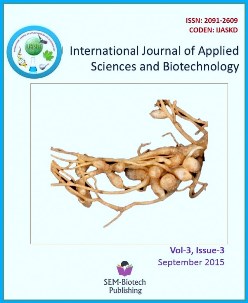Isolation and Characterization of Salt Tolerant Endophytic and Rhizospheric Plant Growth-Promoting Bacteria (PGPB) Associated with the Halophyte Plant (Sesuvium Verrucosum) Grown in KSA
DOI:
https://doi.org/10.3126/ijasbt.v3i3.13440Keywords:
Sesuvium verrucosum, Salinity, ACC deaminase, Phosphate solubilization, Nitrogen fixation.Abstract
This study was designed to isolate and characterize endophytic and rhizospheric bacteria associated with the halophyte plant Sesuvium verrucosum, grown under extreme salinity soil in Jeddah, Saudi Arabia. The plant growth promotion activities of isolated bacterial were evaluated in vitro. A total of 19 salt tolerant endophytic and rhizospheric bacterial isolates were obtained and grouped into six according to genetic similarity based on RAPD data. These six isolates were identified by amplification and partial sequences of 16S rDNA as Enterobacter cancerogenus,Vibrio cholerae, Bacillus subtilis, Escherichia coli and two Enterobacter sp. Isolates were then grown until exponential growth phase to evaluate the atmospheric nitrogen fixation, phosphate solubilization, and production of phytohormones such as indole-3-acetic acid, as well as 1-aminocyclopropane-1-carboxylate (ACC) deaminase activity. While, All of the six strains were negative for ACC deaminaseactivity, two isolates showed Nitrogen fixation activity, three isolates produce the plant hormone (Indole acetic acid) and two isolates have the activity of solubiliztion of organic phosphate. Among the six isolates, the isolate (R3) from the soil around the roots is able to perform the three previous growth promoting possibilities together and it is ideal for use in promoting the growth of plants under the high salinity conditions. This isolate is candidate to prepare a friendly biofertelizer that can be used for the improvement of the crops performance under salinity conditions.
Int J Appl Sci Biotechnol, Vol 3(3): 552-560




